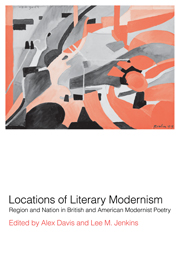Book contents
- Frontmatter
- Contents
- Notes on contributors
- Preface
- INTRODUCTION
- PART ONE OBSTINATE ISLES: THE ANGLO-CELTIC ARCHIPELAGO
- 1 MacDiarmid in Montrose
- 2 Bunting and Welsh
- 3 Antithesis of place in the poetry and life of David Jones
- 4 ‘Shut, too, in a tower of words’: Dylan Thomas' modernism
- 5 ‘Literally, for this’: metonymies of national identity in Edward Thomas, Yeats and Auden
- 6 Reactions from their burg: Irish modernist poets of the 1930s
- PART TWO AN AMERICAN PLACE
- Notes
- Index
3 - Antithesis of place in the poetry and life of David Jones
Published online by Cambridge University Press: 06 July 2010
- Frontmatter
- Contents
- Notes on contributors
- Preface
- INTRODUCTION
- PART ONE OBSTINATE ISLES: THE ANGLO-CELTIC ARCHIPELAGO
- 1 MacDiarmid in Montrose
- 2 Bunting and Welsh
- 3 Antithesis of place in the poetry and life of David Jones
- 4 ‘Shut, too, in a tower of words’: Dylan Thomas' modernism
- 5 ‘Literally, for this’: metonymies of national identity in Edward Thomas, Yeats and Auden
- 6 Reactions from their burg: Irish modernist poets of the 1930s
- PART TWO AN AMERICAN PLACE
- Notes
- Index
Summary
Integral to the poetry of David Jones is symbolic antithesis in which a rural place associated with cultural vitality is threatened by a large, engulfing, dehumanising city. The humane place is sometimes a small city – medieval London in The Anathemata, first–century Jerusalem in ‘The Wall’ and ‘The Dream of Private Clitus’ – but it is usually the countryside and often Celtic. The large city symbolises industrial technological civilisation, which is inimical to humane culture. In all the later poetry, this ‘megalopolis’ is imperial Rome and, by analogy, modern inter–urban civilisation. The antithesis is, of course, a variation on the conventional pastoral polarity of town and country, but there is much more to it than that. Jones' spatial symbolism expresses an original and penetrating cultural theory, which is based on the Spenglerian distinction between culture and civilisation and his own discernment of the kinds of values that characterise each. Gratuitous values characterise culture; the single utilitarian value of efficiency characterises civilisation. Gratuitous acts such as good–night kisses and gratuitous objects such as birthday cakes are innately symbolic – and, in these instances, directly express love; utilitarian or pragmatic acts (fixing a faucet) and objects (a wrench) are not innately symbolic and, in themselves, express nothing. For Jones, a healthy society is one in which gratuitous values balance pragmatism. He is convinced that modern life is dehumanising because pragmatism far outweighs the gratuitous values traditionally expressed in domestic rituals, in art and craft, and in religion.
- Type
- Chapter
- Information
- Locations of Literary ModernismRegion and Nation in British and American Modernist Poetry, pp. 67 - 88Publisher: Cambridge University PressPrint publication year: 2000



